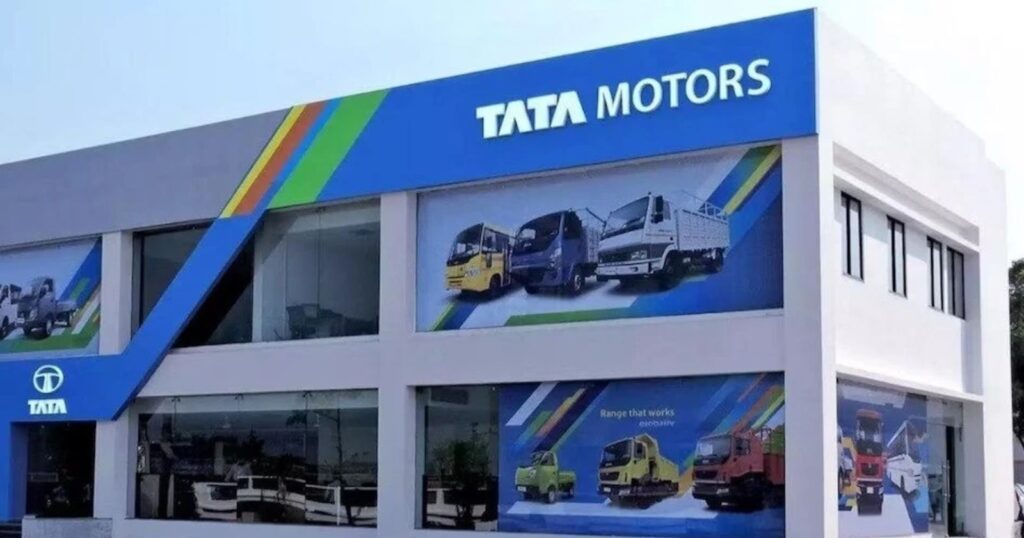Tata Motors Shares Fall After JLR’s Guidance Raises Concerns
Tata Motors saw its share price decline by nearly 5% on Monday after its British subsidiary, Jaguar Land Rover (JLR), provided a cautious outlook for the upcoming financial years. JLR stated that it expects flat free cash flow in FY25 and lower earnings margins in FY26, which caused investor sentiment to weaken.
The stock reacted sharply to the news, falling from previous highs and losing a portion of its recent gains. This development came just after Tata Motors had delivered strong quarterly results and investor confidence was on the rise.
What JLR’s Forecast Means
JLR, which contributes a major portion of Tata Motors’ revenue and profits, outlined its medium-term guidance. While the luxury carmaker expects strong demand in FY25, it also signaled that free cash flow may remain flat for the year. For FY26, the company projects a decline in EBIT margins due to increased investments in electric vehicles (EVs) and product development.
This cautious outlook has raised concerns about the profitability and growth pace of JLR, especially at a time when global auto markets are facing higher costs and softer demand in some regions.
Impact on Tata Motors Investors
The market took this as a warning signal. Investors, particularly short-term traders, responded by booking profits. As a result, Tata Motors shares fell nearly 5% intraday, closing lower on the day. Analysts believe that while the long-term fundamentals of Tata Motors remain solid, the short-term outlook could face pressure due to JLR’s softer cash flow and margin projections.
The share price movement also highlights how closely Tata Motors’ performance is tied to that of JLR. Any slowdown in JLR’s earnings or cash generation often has a direct impact on Tata Motors’ valuation and investor sentiment.
What Analysts Are Saying
Brokerage firms had mixed reactions to the update. Some analysts have retained their “Buy” rating but lowered price targets slightly, factoring in the weaker-than-expected guidance. Others have moved to a “Hold” stance, suggesting that the near-term upside may be limited unless JLR shows signs of margin improvement or stronger EV adoption.
One key area analysts are watching is how quickly JLR can scale its electric vehicle portfolio, which is expected to drive future growth but requires heavy capital investment upfront. If JLR can manage its transition smoothly without hurting cash flow further, the long-term outlook may remain promising.
Tata Motors’ EV Story Still Strong
Despite the fall in share price, Tata Motors continues to lead in the Indian EV space. The company has committed significant resources to electric mobility and has been expanding its EV product lineup in both domestic and international markets. While JLR’s cautious guidance is a concern, Tata’s overall EV roadmap and cost controls in other segments offer some balance to the current pressure.
Looking Ahead
The recent share price drop reflects immediate concerns over cash flow and margins at JLR. However, Tata Motors still holds strong positions in both the Indian passenger vehicle market and the commercial vehicle space. Its continued focus on electric vehicles, combined with long-term cost efficiency programs, may help it recover market confidence over time.
Investors are advised to track further updates from JLR and Tata Motors closely, especially any signals of stronger EV demand or recovery in margins. Until then, the stock may remain volatile in the short term.
Also read: Lava ProWatch Xtreme: A Budget Smartwatch That Packs a Punch
FAQs
Q: Why did Tata Motors shares fall today?
A: Tata Motors shares dropped around 5% after its subsidiary Jaguar Land Rover projected flat free cash flow for FY25 and lower EBIT margins in FY26.
Q: Is this fall due to poor earnings?
A: No, the company’s earnings have been strong. The fall is mainly due to the cautious guidance from JLR regarding future cash flow and profitability.
Q: What does flat cash flow mean for investors?
A: Flat cash flow indicates that the company may not generate excess liquidity, which could affect its ability to invest or return capital to shareholders in the short term.
Q: Should investors be worried?
A: While the short-term outlook is uncertain, Tata Motors still has a strong position in India’s auto market and EV segment. Long-term investors should monitor developments before making decisions.











